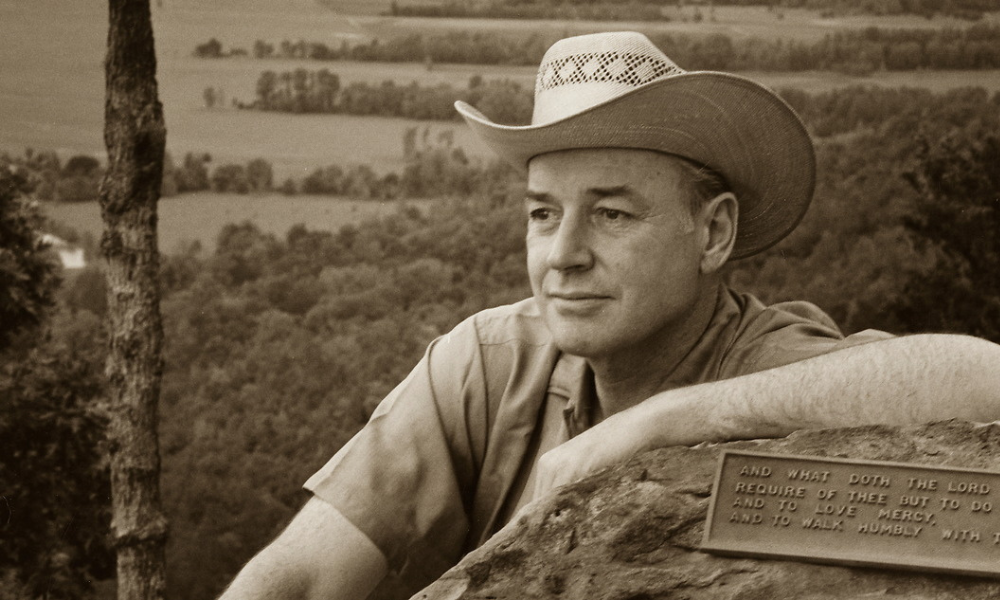by Shana Chaplin
It is always important for those of us at the Winthrop Rockefeller Institute to pause and celebrate the birthday of the man whose home and legacy we have been entrusted with. It is an opportunity to reflect upon his many achievements. For example:
Early Life
Born into wealth and a family with deep-seated philanthropic values, Winthrop Rockefeller chartered his own course, unique and distinct from his brothers. He left school in 1934 to work in the Texas oil fields as a roughneck and roustabout for the Humble Oil and Refining Company, then, in 1941, enlisted as a private in the U.S. Army, where he attained the rank of lieutenant colonel by the time of his discharge in 1946.
His military service was followed by a brief stint back in the oil business, deciding in 1953 to settle permanently in Arkansas. He purchased a 927-acre tract atop Petit Jean Mountain, where he built Winrock Farms, internationally known as a symbol of excellence among Santa Gertrudis owners.
A New Leader Emerges
Winthrop believed his wealth, like his family’s, should be used to advance freedom and philanthropic achievements. He poured himself into service. In 1955, Gov. Orval Faubus appointed Winthrop as chair of the new Arkansas Industrial Development Commission. Under his eight-year leadership, the commission helped 600 industries locate to or expand in Arkansas, creating more than 100,000 job opportunities. As the state Republican National committeeman beginning in 1961, he led efforts to bring about a two-party system in heavily Democratic Arkansas.
As Governor of Arkansas
He ran for governor in 1964 and received 44% of the vote, which doubled the previous record of total votes cast in the state for any Republican candidate. He then successfully ran in 1966 and took office in 1967 as the first Republican governor in Arkansas in 94 years. Winthrop won re-election in 1968 but lost in a three-way race in 1970. His tenure as governor was marked by reform of the state penal system, governmental reorganization, tighter insurance and securities regulation, and enactment of the Freedom of Information Act of 1967.
But what is most important to reflect upon is the man himself. When I picture Gov. Rockefeller, it is not that of a man in a suit standing with an authoritative presence before a crowd of people. Instead, it is the picture of a man in everyday khakis and work boots, holding a cup of coffee alongside a cigarette, standing on the edge of his beloved mountain, looking out over the valley and the winding Arkansas River.
The other picture in my mind’s eye is a man similarly dressed, sitting at a large dining table, intently listening to the diverse group of people he intentionally gathered for a shared meal and conversation. Winthrop Rockefeller was a man of the people. He was welcoming, genuine, curious, concerned, hardworking, and playful. He shared his position, wealth, and beloved mountaintop with anyone. He was known for entertaining, hosting large groups for difficult conversations, welcoming yellow school buses full of children, and offering a space for rest, play, and rejuvenation.
In an unpublished manuscript, Winthrop sought to show his son, Lt. Governor Winthrop Paul Rockefeller, what sort of man he was, what he believed in, and what he worked for.
“The biggest thing I have tried to show you is the joy and satisfaction that comes from knowing the people around you — people in every position in life — and understanding and appreciating their strengths and weaknesses. The understanding of men and women can be one of the greatest richnesses you will ever know. … Mutual understanding and respect between people is something we have to keep working for, and sometimes fighting for.”
A Letter to My Son by Winthrop Rockefeller
So, as we pause to reflect and to celebrate, it is to keep working for and sometimes fighting for understanding. It is not just an ethic of work and collaboration we seek to promote but a deep desire to individually and collectively emulate a man whose mission was to be a “catalyst who hopefully serves to excite in the hearts and minds of people a desire to shape our own destiny.”
We invite you to join us in celebrating, but more importantly, to join us in the search for understanding, pursuing the joy that comes from knowing those around you.
Join our newsletter!
Sign up and we’ll keep you in the loop about all of our latest news, programs, and ways to get involved.
"*" indicates required fields


